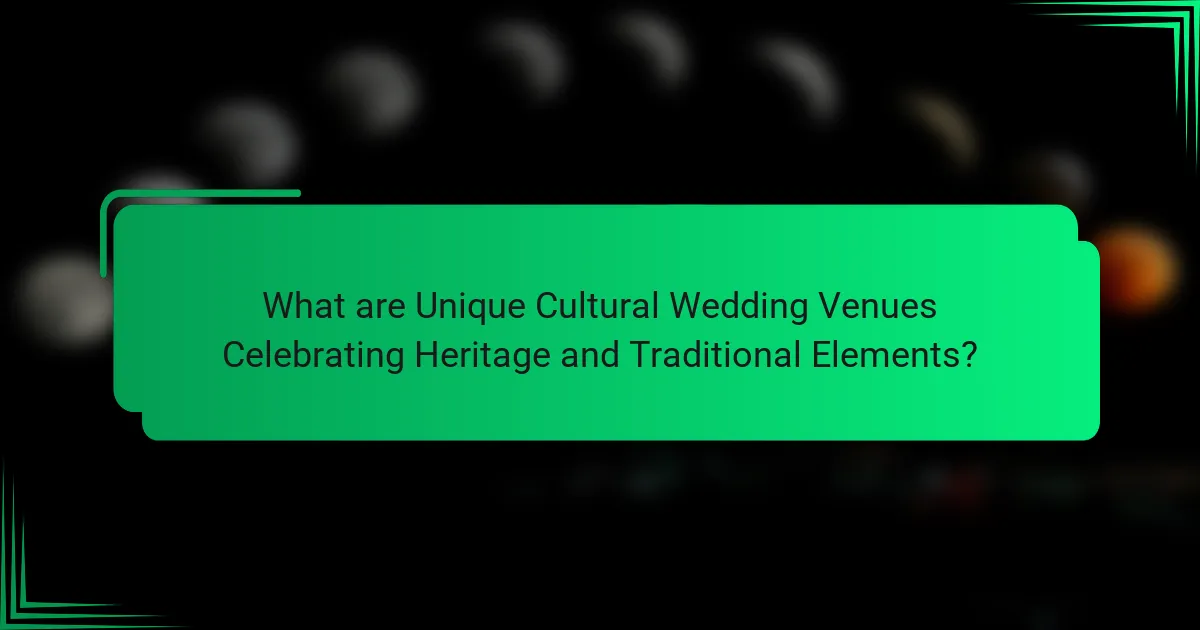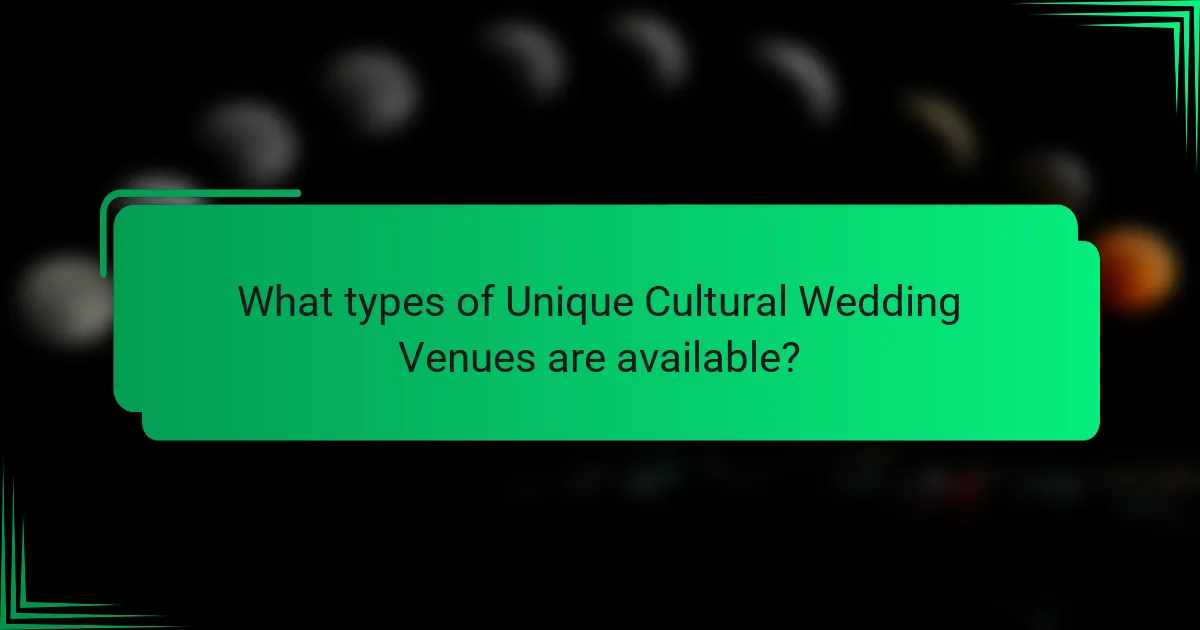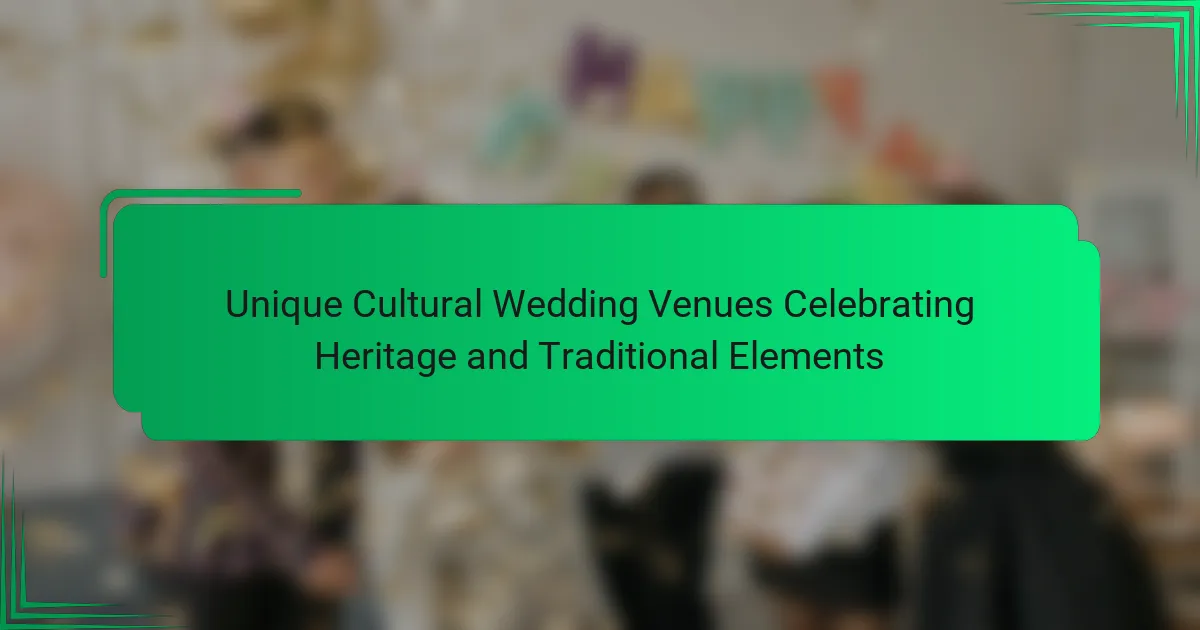Unique cultural wedding venues are locations that reflect specific cultural backgrounds and traditions, offering a range of architectural styles and decor that resonate with heritage. These venues include historic castles, traditional temples, rustic barns, botanical gardens, art galleries, and cultural centers, each providing distinct atmospheres and experiences. Couples can enhance their wedding by incorporating local customs, traditional attire, and ethnic cuisine, while collaborating with local vendors to create an authentic celebration. Understanding the cultural significance of the venue and engaging with its history allows couples to personalize their ceremonies and honor their ancestry, resulting in a meaningful and memorable event.

What are Unique Cultural Wedding Venues Celebrating Heritage and Traditional Elements?
Unique cultural wedding venues celebrating heritage and traditional elements include locations that reflect specific cultural backgrounds. These venues often feature architecture, decor, and customs that resonate with particular traditions. Examples include historic castles, traditional temples, and culturally significant community centers. Many of these venues offer unique experiences, such as traditional ceremonies and ethnic cuisine. For instance, a traditional Indian wedding venue may include a mandap for rituals. Cultural venues often provide opportunities for couples to honor their ancestry. They may also offer packages that include traditional attire and ceremonies. This approach enhances the wedding experience by integrating meaningful cultural practices.
How do these venues reflect cultural heritage?
Unique cultural wedding venues reflect cultural heritage through architecture, decor, and rituals. These venues often showcase traditional designs that embody the history of a community. For example, a venue may feature indigenous building styles or materials that have been used for generations. Decor elements can include artifacts or symbols significant to the local culture. Rituals performed during weddings at these venues often draw from longstanding traditions. This adherence to cultural practices reinforces the community’s identity. Additionally, venues may host events that educate visitors about cultural significance. Such aspects highlight the importance of preserving heritage in modern celebrations.
What specific cultural elements are commonly featured in these venues?
Cultural elements commonly featured in unique wedding venues include traditional architecture, local art, and regional cuisine. Traditional architecture reflects the heritage of the area, showcasing styles that are historically significant. Local art often decorates the space, highlighting the craftsmanship and artistic expression of the community. Regional cuisine is typically served, offering guests a taste of local flavors and culinary traditions. These elements create an immersive cultural experience for attendees. Many venues also incorporate traditional music and dance, enhancing the overall atmosphere and celebrating cultural customs. Additionally, rituals and ceremonies specific to the culture may be performed, further emphasizing the venue’s heritage.
How do architectural styles contribute to the uniqueness of these venues?
Architectural styles define the visual and functional identity of unique cultural wedding venues. Each style reflects the historical and cultural context of the region. For instance, Gothic architecture features pointed arches and intricate details, creating a dramatic atmosphere. In contrast, Mediterranean styles emphasize open spaces and natural light, promoting a relaxed ambiance. These distinct characteristics attract couples seeking venues that resonate with their heritage. Furthermore, specific elements, such as traditional materials and craftsmanship, enhance the authenticity of the experience. The integration of local architectural styles also fosters a sense of belonging and cultural pride among guests. Thus, architectural styles play a crucial role in making each venue unique and memorable.
Why are these venues important for cultural preservation?
These venues are important for cultural preservation because they serve as tangible representations of cultural heritage. They provide a space for communities to celebrate and practice traditional customs. Unique cultural wedding venues often embody architectural styles and designs that reflect historical significance. They foster intergenerational connections by allowing families to pass down traditions. Events held at these venues reinforce cultural identity and community cohesion. Studies show that cultural venues contribute to local economies and tourism, further emphasizing their significance. By hosting weddings and ceremonies, these venues help maintain cultural narratives and practices.
How do unique cultural wedding venues support local traditions?
Unique cultural wedding venues support local traditions by providing spaces that reflect and honor regional customs. These venues often incorporate architectural styles and decor that are significant to the local culture. For instance, a traditional barn venue may host rustic ceremonies that highlight agricultural heritage. Additionally, they may offer catering services featuring local cuisine, reinforcing culinary traditions.
Such venues often encourage the use of traditional attire and rituals during ceremonies. This fosters a deeper connection between the couple and their cultural roots. Moreover, they may host workshops or events that educate couples about local customs. This engagement helps preserve these traditions for future generations.
Statistical data shows that couples who choose culturally themed venues are more likely to incorporate traditional elements into their weddings. This trend supports the ongoing relevance of local customs in modern celebrations.
What role do these venues play in community identity?
Unique cultural wedding venues significantly contribute to community identity. They serve as focal points for cultural expression and heritage preservation. These venues often reflect the historical and social narratives of the community. They provide a space for traditional ceremonies, reinforcing cultural practices. Events held in these venues foster community bonding and shared experiences. Research indicates that such venues enhance local pride and belonging. They attract visitors, supporting local economies and cultural tourism. Overall, unique cultural wedding venues are vital in shaping and maintaining community identity.

What types of Unique Cultural Wedding Venues are available?
Unique cultural wedding venues include historic castles, traditional temples, and rustic barns. Historic castles offer a regal backdrop with rich history. Traditional temples provide spiritual significance and architectural beauty. Rustic barns create a charming, countryside atmosphere. Other options include botanical gardens, art galleries, and cultural centers. Botanical gardens showcase natural beauty and vibrant flora. Art galleries offer a modern, artistic environment. Cultural centers celebrate community heritage and diversity. Each venue type reflects unique cultural elements and traditions.
How can couples choose the right venue for their cultural celebration?
Couples can choose the right venue for their cultural celebration by considering several key factors. First, they should identify venues that reflect their cultural heritage. This can include locations known for their architectural style or historical significance related to their culture. Next, couples should assess the venue’s capacity to accommodate their guest list comfortably. A venue that is too small may feel cramped, while one that is too large may feel impersonal.
Additionally, couples should evaluate the venue’s amenities and services. This includes catering options that offer traditional cuisine and spaces for cultural rituals. Accessibility is also crucial; venues should be easy for guests to reach and navigate. Couples may want to consider venues that provide a unique ambiance that complements their cultural themes.
Finally, couples should review the venue’s policies and pricing. Understanding the costs and any restrictions is essential for budgeting effectively. By focusing on these aspects, couples can select a venue that enhances their cultural celebration and creates a memorable experience for all attendees.
What factors should be considered when selecting a cultural wedding venue?
When selecting a cultural wedding venue, consider the venue’s cultural significance. The venue should reflect the traditions and values of the couple’s heritage. Accessibility is also crucial; guests should easily reach the location. Capacity must accommodate the guest list comfortably. Additionally, the venue’s ambiance should align with the desired wedding theme. Consider the availability of necessary amenities, such as catering and decoration options. Budget constraints are essential; ensure the venue fits within financial limits. Lastly, check for any restrictions regarding cultural ceremonies or rituals at the venue.
How do venue capacities affect the choice of location?
Venue capacities significantly influence the choice of location for events. A venue’s capacity determines how many guests can be accommodated. This directly impacts the selection process for weddings and cultural events. Smaller venues may enhance intimacy for close-knit gatherings. Conversely, larger venues are suited for grand celebrations with extensive guest lists. The intended atmosphere also plays a crucial role. An intimate setting can foster connection among guests. In contrast, a spacious venue allows for more elaborate decorations and layouts. Additionally, venue capacity affects budget considerations. Larger venues often come with higher rental costs. Therefore, the choice of location must align with both guest count and budget.
What are some examples of Unique Cultural Wedding Venues around the world?
Some examples of unique cultural wedding venues around the world include the Taj Mahal in India, a symbol of love and architectural beauty. Another is the Santorini clifftop in Greece, offering stunning views and a romantic atmosphere. In Japan, traditional Shinto shrines provide a serene and spiritual setting for weddings. The Icehotel in Sweden, made entirely of ice and snow, offers a one-of-a-kind winter wonderland experience. In Mexico, the ancient ruins of Tulum serve as a breathtaking backdrop for ceremonies. Each venue reflects the cultural heritage and unique traditions of its location, enhancing the wedding experience.
What unique features do these venues offer?
Unique cultural wedding venues offer distinctive architectural styles that reflect specific heritages. These venues often include traditional decor that showcases local craftsmanship. Many feature outdoor spaces that enhance the cultural ambiance, such as gardens or courtyards. Some venues provide authentic culinary experiences with traditional cuisine specific to the culture. Local music and dance performances are frequently included, enriching the celebratory atmosphere. Unique rituals or ceremonies tied to cultural customs may also be available. These elements create a memorable experience that honors the couple’s heritage. Specific examples include historic buildings, cultural centers, and nature-based venues that embody cultural significance.
How do these venues accommodate different cultural practices?
Unique cultural wedding venues accommodate different cultural practices by offering tailored services and customizable spaces. These venues often provide diverse catering options that reflect various culinary traditions. They may also have specific areas designed for rituals, such as altars or stages for ceremonies. Many venues allow for traditional decor that aligns with cultural aesthetics. Additionally, staff members are usually trained to understand and respect different cultural customs. Some venues may offer multilingual services to cater to diverse guests. They often collaborate with cultural consultants to ensure authenticity in practices. This approach helps create an inclusive environment that respects and celebrates cultural diversity.

How can couples enhance their wedding experience at these venues?
Couples can enhance their wedding experience at unique cultural venues by incorporating local traditions and elements. They should research the cultural significance of the venue. This allows them to choose meaningful rituals or customs to include in the ceremony. Collaborating with local vendors can also enrich the experience. Local caterers can provide traditional cuisine that reflects the culture. Hiring musicians who specialize in cultural music can create an authentic atmosphere. Additionally, couples can design their decor to reflect the venue’s heritage. This might include traditional textiles, art, or symbols significant to the culture. Engaging with the venue’s history can also add depth to their celebration. Understanding the stories behind the venue can create a more personal connection for the couple and their guests.
What traditional elements can be incorporated into the wedding ceremony?
Traditional elements that can be incorporated into the wedding ceremony include rituals, music, attire, and symbols. Rituals often reflect cultural heritage, such as the exchanging of vows or lighting a unity candle. Music can enhance the atmosphere, featuring traditional songs or instruments specific to the couple’s culture. Attire typically consists of culturally significant garments, like a wedding kimono or a saree, which symbolize heritage. Symbols, such as the use of rings or specific flowers, can represent love and commitment. These elements enrich the ceremony, making it more meaningful and reflective of the couple’s backgrounds.
How can local customs be integrated into the wedding festivities?
Local customs can be integrated into wedding festivities through various meaningful practices. Couples can incorporate traditional rituals that reflect their cultural heritage. This may include specific ceremonies, attire, or music that is significant to their background. For example, a couple might choose to perform a traditional dance or include symbolic items in their ceremony. Additionally, local cuisine can be featured prominently in the wedding menu, showcasing regional dishes. Inviting local artisans for decorations can also enhance the cultural experience. These elements not only honor heritage but also create a unique atmosphere for guests. Integrating local customs enriches the wedding’s significance and fosters a sense of community.
What are some popular cultural rituals to include in the ceremony?
Popular cultural rituals to include in the ceremony are unity ceremonies, traditional blessings, and cultural dances. Unity ceremonies symbolize the joining of two families. They often include lighting a unity candle or pouring sand together. Traditional blessings may involve elders offering prayers or blessings for the couple. Cultural dances celebrate heritage and involve community participation. These rituals enhance the significance of the ceremony and connect it to cultural traditions. Each ritual reflects the couple’s background and values, making the event more meaningful.
What tips can help couples plan a successful wedding at a cultural venue?
Couples can successfully plan a wedding at a cultural venue by thoroughly researching the venue’s history and significance. Understanding the cultural elements will help in making informed decisions. Couples should also consider the venue’s capacity and layout to ensure it accommodates their guest list comfortably. Booking the venue well in advance is crucial, as popular cultural sites often have limited availability. Collaborating with vendors familiar with the venue’s customs can enhance the wedding experience. Couples should also respect the cultural traditions associated with the venue, incorporating them into their ceremony and reception. Finally, clear communication with venue staff about expectations and requirements will facilitate a smoother planning process.
How can couples effectively communicate with venue staff about cultural requirements?
Couples can effectively communicate with venue staff about cultural requirements by clearly outlining their specific needs. They should prepare a detailed list of cultural practices and rituals they wish to incorporate. This list should include dietary restrictions, traditional attire guidelines, and specific ceremonial elements. Couples should arrange a meeting with the venue staff to discuss these requirements in person. During this meeting, they can provide context for each requirement, enhancing understanding. It is also beneficial to share any relevant cultural materials or references that illustrate their traditions. Couples should encourage open dialogue, allowing staff to ask questions for clarity. This approach fosters collaboration and ensures that cultural elements are respected and integrated into the event. Effective communication can lead to a more personalized and meaningful celebration.
What are best practices for ensuring cultural sensitivity during the celebration?
Best practices for ensuring cultural sensitivity during celebrations include thorough research on the cultural traditions being represented. Understanding the significance of specific customs is essential. Engaging with community members can provide valuable insights and perspectives. Inviting cultural representatives to participate fosters inclusivity and respect. Using culturally appropriate symbols and decorations shows acknowledgment of the heritage. Providing educational materials about the culture can enhance understanding among guests. Ensuring that food and dietary restrictions are respected is also crucial. Lastly, being open to feedback helps in making necessary adjustments for future celebrations.
Unique cultural wedding venues are locations that reflect specific cultural backgrounds through their architecture, decor, and customs. These venues, including historic castles, traditional temples, and community centers, offer unique experiences that honor ancestry and integrate meaningful cultural practices, such as traditional ceremonies and ethnic cuisine. The article explores how these venues reflect cultural heritage, support local traditions, and contribute to community identity, while also providing guidance on selecting the right venue and incorporating cultural elements into wedding celebrations. Key factors such as venue capacity, architectural styles, and the importance of cultural sensitivity are also discussed to enhance the wedding experience.
